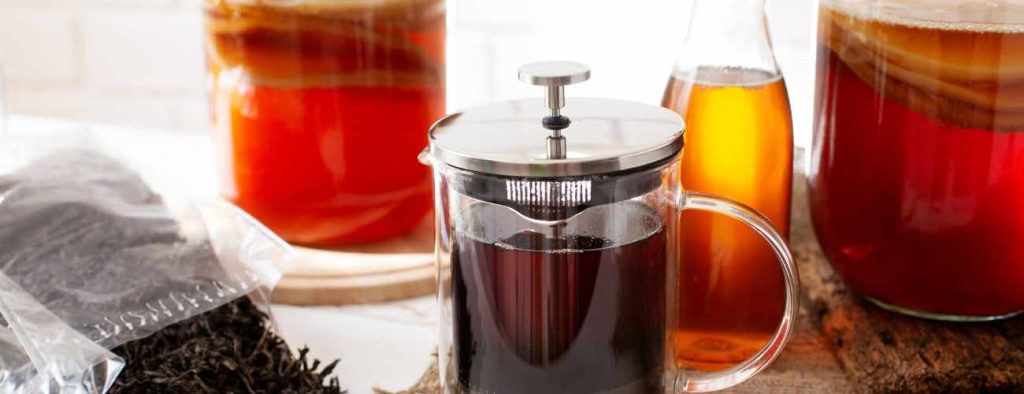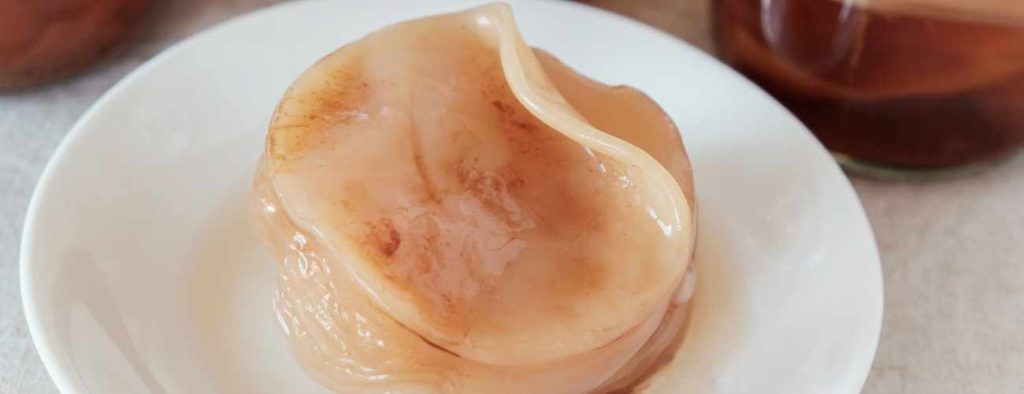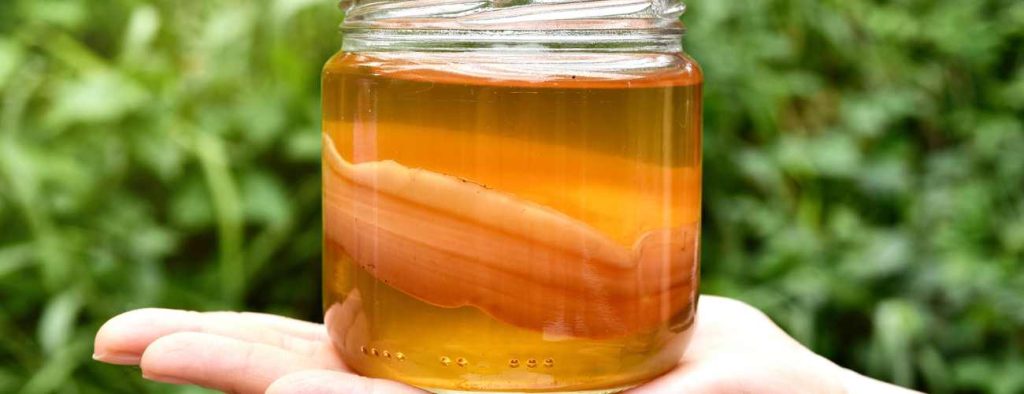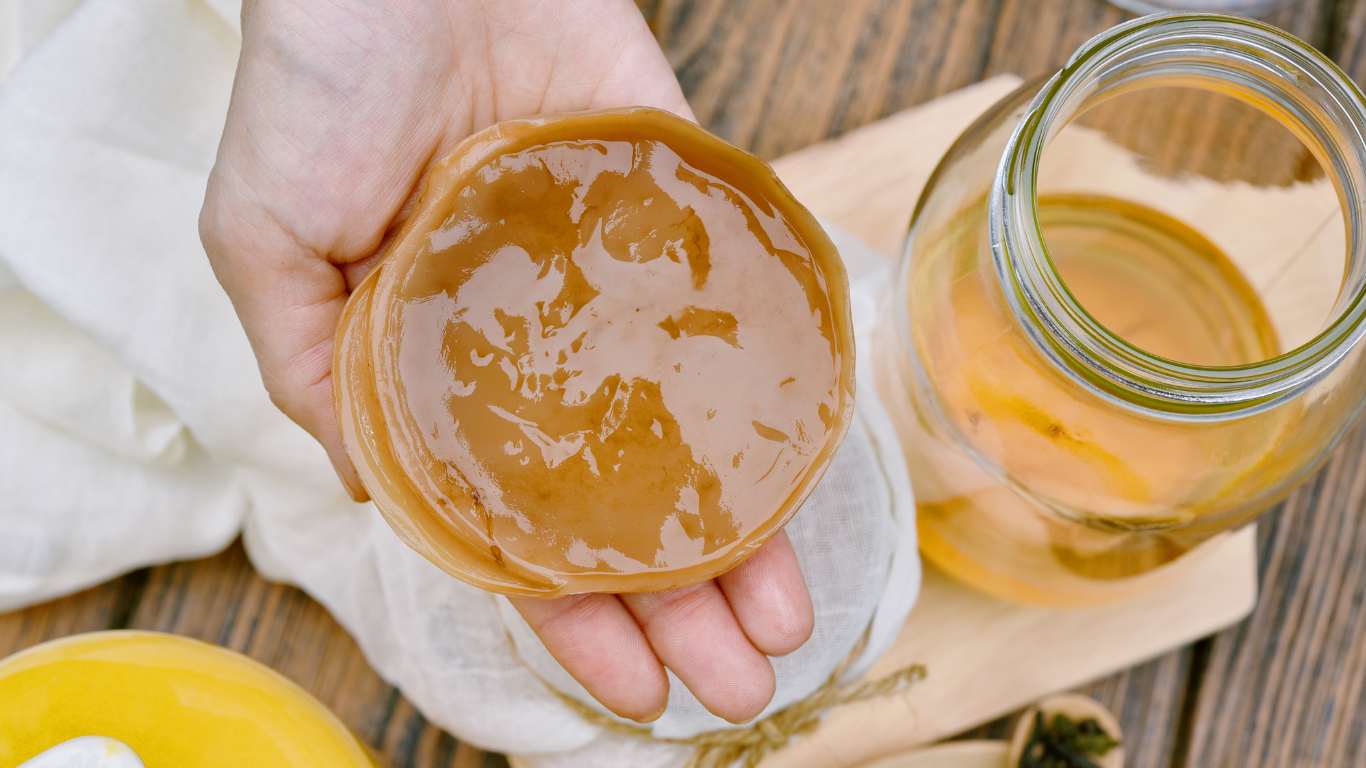Traditionally, kombucha has been one of the main sources of SCOBY cultivation. But many times, it becomes necessary to grow SCOBY without kombucha, especially when the ingredients for kombucha are missing. So, this brings home cooks to a widely asked question- can you grow SCOBY without kombucha?
SCOBY also stands for Symbiotic Culture Of Bacteria and Yeast can be grown using alternative methods. These methods include fermenting sweetened tea, fermented fruits method, growing SCOBY from commercial starter cultures, etc.
Whether you are a curious beginner or a seasoned fermented, there is much to uncover when we are discussing growing your own SCOBY. Moreover, growing SCOBY without kombucha is more complex than we primarily understand as we also need to understand the science behind growing SCOBY. So, keep on reading to uncover the complete guide to growing SCOBY.
How Do You Grow A SCOBY From Scratch Without Kombucha
Growing a SCOBY from scratch without kombucha can be a bit trickier, but it’s definitely possible.
We need to understand the art and science behind the unique methods that help us grow SCOBY without kombucha. Here are some of the most widely popular methods that you can use to grow SCOBY.
Vinegar and Sweetened Tea Method
One of the most popular and unique approaches to growing SCOBY from scratch without using kombucha is following the vinegar and sweetened tea method. To initiate SCOBY growth, a concoction of white vinegar is combined with sweetened tea brewed from black or green tea leaves infused with sugar.
This mixture is then carefully poured into a pristine glass container, ensuring a conducive environment for SCOBY development. After that, the container is covered with a breathable cloth or coffee filter and securely fastened with a rubber band. This is done to ward off contaminants while allowing sufficient airflow.
The container is placed in a warm and dimly lit space for SCOBY formation. This fermentation process takes around 1-2 weeks to uncover. As the days progress, the culture of bacteria and yeast gradually materializes. Thus, the sweetened tea and vinegar solution turns into a thriving ecosystem ready for further fermentation recipes.

Fermented Fruit Method
To craft your own SCOBY without the need for pre-existing kombucha cultures, you can also use the fermenting fruit method. In this method, start by carefully coating chopped non-citrus fruit with sugar, ensuring each piece is evenly coated. Transfer the sugar-infused fruit into a clean jar brimming with non-chlorinated water.
Next, add half a cup of vinegar to the mixture to provide the necessary acidity for fermentation. Secure the jar with a tightly woven cloth to ward off contaminants while permitting airflow. Allow the fruit to ferment in a dim, ambient-temperature space for a duration of three to four weeks, remembering to stir the mixture weekly to encourage fermentation.
After this period, transfer the fermented fruit into a jar filled with water, and continue the fermentation process for an additional week. During this time, a discernible SCOBY should emerge atop the liquid’s surface, signifying its maturation. This innovative method offers an easy-to-use alternative to traditional SCOBY cultivation.
Commercial SCOBY Starter Cultures
Another widely used method to grow SCOBY without kombucha is done by commercial SCOBY starter cultures. To kickstart SCOBY growth, you can get yourself commercial SCOBY starter cultures readily available at various brewing supply stores. These starter cultures come with detailed instructions, guiding you through the whole process.
Typically, the process entails brewing sweetened tea and introducing the commercial SCOBY starter culture into the mixture. Once combined, the fermenting liquid is left to undergo the transformative fermentation process. The SCOBY then gradually forms over the course of 1-2 weeks.
So, the commercial SCOBY starter culture method provides a convenient and reliable way for beginners and seasoned fermenters alike to initiate SCOBY growth. The best part about using commercial alternatives is you can get the exact recipes that you want in your starter culture. So, it becomes easy for both home cooks and amateur brewers to ensure a successful fermentation.
What Does SCOBY Need To Grow?
SCOBY, requires specific conditions to thrive and grow effectively. This includes a nutrient-rich environment, adequate oxygen supply, moderate temperature range, and pH balance.
We have gone through the ways of growing SCOBY without using kombucha. However, we still need to figure out the optimal conditions that ensure a smooth completion of growing your own SCOBY. So, here are some key factors essential for SCOBY growth that you can look into.

Nutrient-Rich Environment
SCOBY requires a nutrient-rich environment to flourish. It feeds on sugars present in the fermenting liquid, typically derived from sweetened tea or other sugary mediums. These sugars serve as the primary food source for the bacteria and yeast within the SCOBY.
During the fermentation process, the SCOBY metabolizes the sugars. This produces organic acids and other byproducts that contribute to the tangy flavor and effervescence of the final beverage.
Adequate Oxygen Supply
Oxygen is crucial for the aerobic bacteria present in the SCOBY to thrive. The aerobic bacteria utilize oxygen during the initial stages of fermentation to metabolize sugars and establish a healthy microbial ecosystem.
Providing adequate airflow to the fermenting liquid, such as by covering the fermentation vessel with a breathable cloth. This ensures that the SCOBY receives sufficient oxygen for optimal growth and fermentation.
Moderate Temperature Range
SCOBY thrives within a moderate temperature range, typically between 70°F to 85°F (21°C to 29°C). This temperature range supports the growth and activity of the bacteria and yeast within the SCOBY, facilitating efficient fermentation.
Extreme temperatures, whether too hot or too cold, can inhibit SCOBY growth and compromise the quality of the final fermented beverage. It’s essential to maintain a consistent and moderate temperature throughout the fermentation process.
pH Balance
Maintaining an optimal pH balance is crucial for SCOBY growth and fermentation. The ideal pH range for SCOBY fermentation is slightly acidic, typically between 3.0 to 3.5.
As the SCOBY metabolizes sugars, it produces organic acids that lower the pH of the fermenting liquid. This acidic environment not only promotes SCOBY growth but also helps inhibit the growth of harmful bacteria and mold. Monitoring and adjusting the pH levels of the fermenting liquid, if necessary, ensure that the SCOBY remains healthy and productive throughout the fermentation process.
Does SCOBY Need Sunlight
No, SCOBY does not need sunlight. Rather, SCOBY grows well in the absence of direct sunlight. One of the essential factors of growing SCOBY is to keep the container in a dark or dimly lit place. Direct sunlight or increased heat can spoil your SCOBY growth.

SCOBY, and Yeast, thrives without direct sunlight during the fermentation process. Exposure to sunlight poses risks to SCOBY health and fermentation quality due to factors such as UV radiation, temperature fluctuations, and increased contamination risk.
UV radiation from sunlight can disrupt the delicate balance of bacteria and yeast within the SCOBY, potentially weakening its structure. Moreover, excessive heat generated by direct sunlight can stress the SCOBY and hinder fermentation by elevating temperatures beyond optimal ranges.
Additionally, sunlight exposure increases the likelihood of contamination by undesirable microorganisms, such as mould or harmful bacteria, which can compromise the fermentation process. To ensure healthy SCOBY growth and successful fermentation, it’s recommended to ferment SCOBY in a dark or dimly lit environment at moderate room temperature.
If you are wondering how long your SCOBY last, I recommend you to check out my blog which answers this question and more!
Conclusion
Growing your own SCOBY without kombucha can be a tricky task, but with the right guidelines, anyone can master it. Before you start making your own SCOBY, make sure you have a thorough understanding of the science behind growing SCOBY. In this way, home cooks and beginner brewers, all can excel at making their own SCOBY from scratch without using kombucha.



